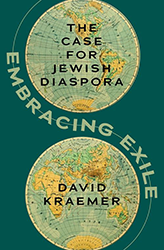
We are living in an era when deep suspicion of migrants is normalized, when people who have escaped their homes seeking refuge from war or poverty are characterized as criminals. Others pursuing better lives — lives of which they have only dreamed — are turned away as enemies. We witness the overheated rhetoric of “they” will replace us, “they” will join our enemies; we, therefore, are instructed to protect ourselves and our values in the homes we so cherish, homes where we belong and they do not.
While all these emotions and the defensive postures they generate are readily understandable, they fail to appreciate one of the fundamental lessons of the religious traditions of the West. Our common biblical heritage comments often — directly and indirectly — on what it means to be a refugee, to be in exile. The sum of those comments leads to one unambiguous conclusion: we are all refugees, and exile is the eternal human condition.
Consider the story with which the biblical tradition begins: Adam and Eve in the Garden of Eden. True, the Garden is ostensibly these humans’ first home. But it is a home that lasts barely an instant (one rabbinic midrash claims that Adam and Eve were in the Garden for just a few short hours). According to biblical tradition, human history begins when the first woman and man were expelled from the Garden — they and their offspring forever living in exile, wandering the face of the earth.
Adam and Eve hardly could have dreamed of a better life elsewhere. The distinction of the first “dreamers” falls to the first family of biblical tradition, Abraham and Sarah. Crucially, these individuals — the first to imagine a world united under one true God — were told by that God to leave their land, their birthplace, their ancestral home; to begin a new, better life elsewhere. Fulfilling this dream required leaving home.
Our common biblical heritage comments often — directly and indirectly — on what it means to be a refugee, to be in exile. The sum of those comments leads to one unambiguous conclusion: we are all refugees, and exile is the eternal human condition.
These scenarios are familiar ones, having been relived again and again through human history up to the present day. Humans have been expelled from their homes by war, famine, local environmental degradation, and more. They have left their homes to find new opportunities, recognizing that their lives could be more peaceful or richer elsewhere. A “Golden Age” in one locale attracted dreamers from another. In the scheme of history, humans rarely sat still.
Our species today traces its roots to the first humans in Africa, though not all of us stayed there. Examine our DNA today and you will discover inputs from our multiple homes over generations and generations. And yet, so often in our world today, we still consider ourselves to be at home, and others, whom we deem “foreigners,” are thought to be encroaching on what belongs to us.
If we take the lesson of the biblical foundation seriously, we will recognize that we are all in exile. Our homes are our homes because this is where we landed. Perhaps if we recall that my grandparents fled Ukraine and yours fled Italy or Ireland — if we acknowledge that we were all forced from our homes in the past and likely will again be forced in the future — we will be able to respond in a kinder, more merciful, and more welcoming manner to those who find themselves as refugees today. Fundamentally, we are they, because as humans we all have the same experience. Our turn will come, and if we hope to find a welcoming hand when we flee, it behooves us to offer that welcoming hand now.

Embracing Exile: The Case for Jewish Diaspora by David Kraemer
David Kraemer is Joseph J. and Dora Abbell Librarian at the Jewish Theological Seminary, where he has also served as Professor of Talmud and Rabbinics for many years. As Librarian, he is at the helm of the most extensive collection of Judaica-rare and contemporary-in the Western hemisphere. He is the author of several books on Rabbinic Judaism and its texts, the social and religious history of Jews in antiquity, and Jewish rituals and their development.